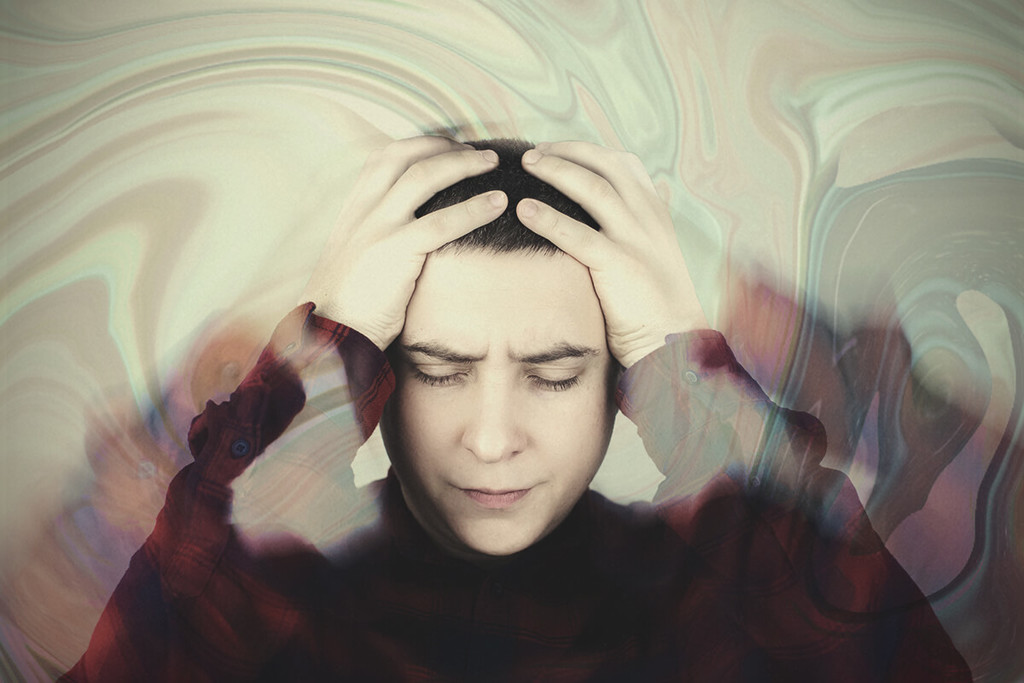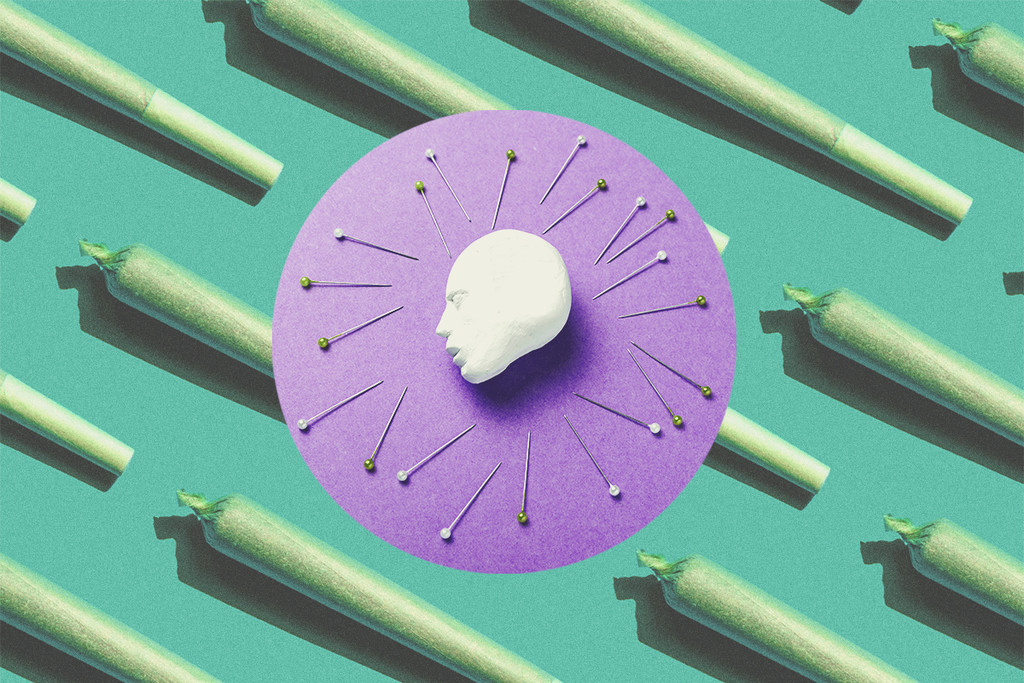.
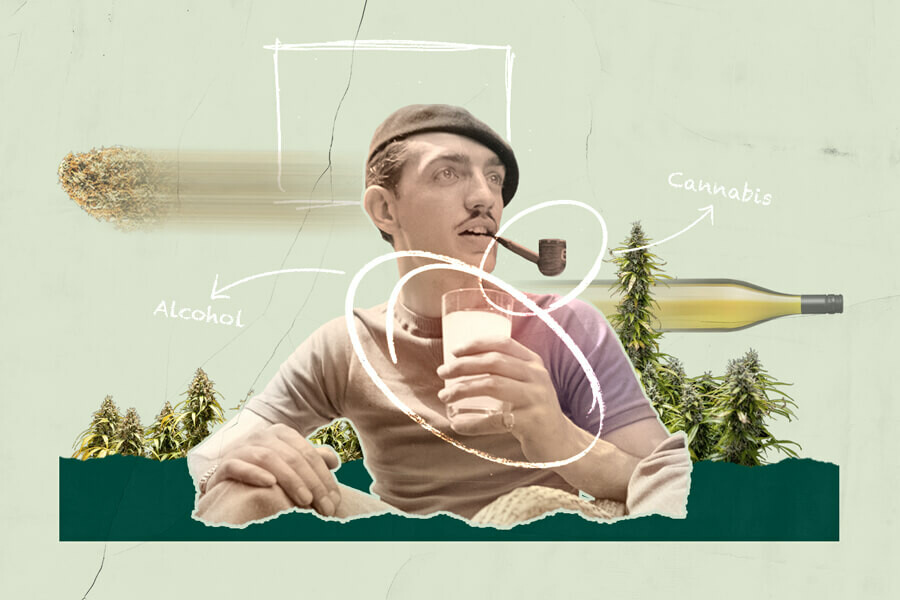
Cannabis vs Alcohol
Few substances divide public opinion more than cannabis and alcohol. Both have faced total prohibition, both can influence the way we think and feel, and both have defined entire subcultures. However, is one superior to the other, and, despite widespread use of alcohol, could cannabis prove a healthier alternative? Keep reading to find out.
Contents:
Many of us don’t think twice about having a cold beer or a glass of wine after a long day of work. But as public opinion shifts and regulations change, it seems that alcohol is slowly being replaced with freshly rolled joints. So, what is it about cannabis that seems to be attracting more and more people?
According to data from a YouGov poll[1], safety appears to be a significant concern. In fact, the majority of Americans think that regular alcohol and tobacco consumption is more harmful to health than marijuana. But is there more to it than that? Join us as we take a deep dive into the world of alcohol and cannabis use, and see if we really are heading for a green revolution.
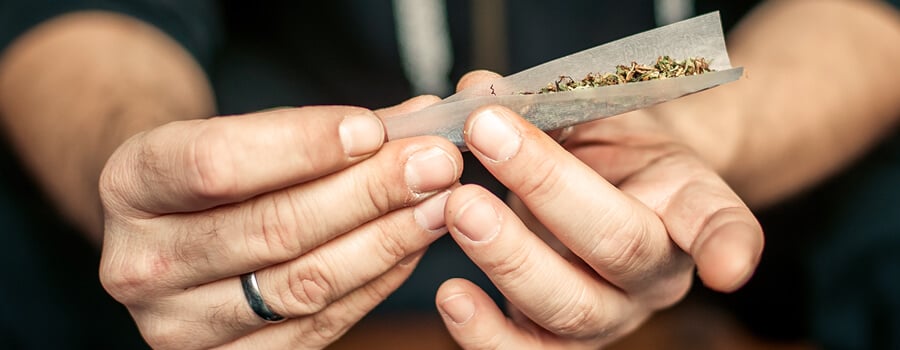
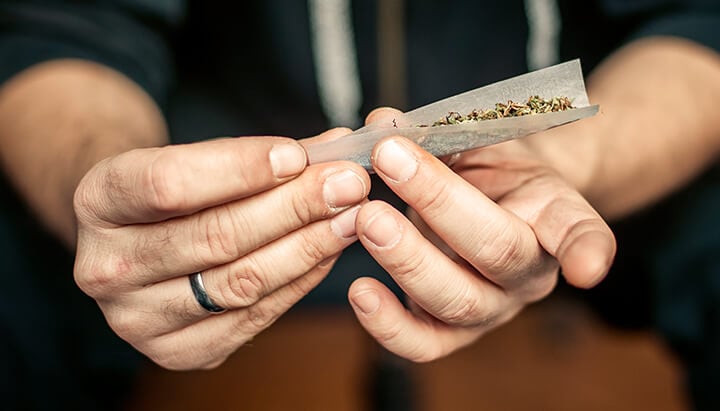
Is Alcohol Better Than Weed, or Is It the Other Way Around?
When trying to discern if one substance is better than another, we need to break down their primary factors. How do they affect health, what do they cost, and which one is more socially acceptable than the other? But when it comes to distinct substances like alcohol and weed, is it even possible to compare the two? While one is widely accepted (and generally encouraged) the world over, the other faces an uphill battle, with many countries still totally against recreational marijuana use.
Still, despite the barriers to use, data on multiple fronts suggests that there is a slow but prominent shift away from regular alcohol consumption, with many leaning towards cannabis as a direct replacement[2]. With responsible use in mind, let’s take a closer look at the ongoing battle between cannabis and alcohol.
Cannabis vs Alcohol
To understand this unique shift in behaviour, we need to break down the broad influence both substances have on areas such as our health, our wallet, and the perspectives of people around us.
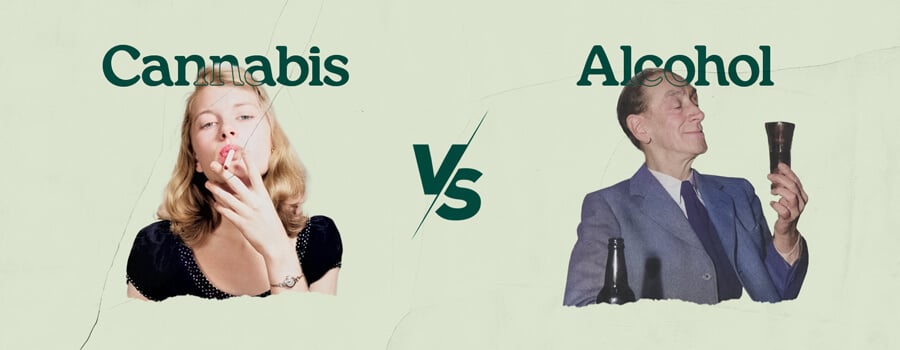
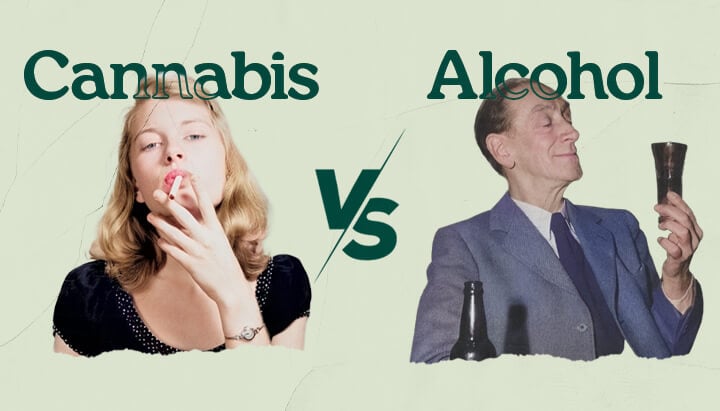
-
Recreational Use
Evidence of alcohol use dates back as far as 7000 BCE, compared to 2800 BCE for cannabis, but both substances have their foundations in Central Asia. Since then, alcohol and cannabis have undergone their fair share of challenges, including a period of alcohol prohibition during the 1920s and, of course, the continued prohibition of cannabis.
While access to cannabis is slowly becoming easier, many cultures still view alcohol as a rite of passage. There may be limits on what age we can legally drink, but it’s common for people to spend lots of money going out and drinking away the weekend.
Unfortunately, it’s difficult to directly compare the two recreationally, as we simply don’t have the same access to cannabis as we do alcohol. Still, in areas where cannabis is legal, such as California, there seems to be a shift in favourability[3]. And much of that shift comes down to the proposed long-term effects that alcohol has on the body. That’s not to say that cannabis is devoid of negative or unwanted side effects, but from a recreational point of view, “a growing share of cannabis consumers report daily or near-daily use, and their numbers exceed the number of daily and near-daily drinkers”.
-
Social Acceptance
Potential health implications aren’t the only driver behind increased cannabis use; it’s how the herb is viewed by the wider community. The perspectives of our social circle, friends, and family have a profound impact on our life choices. Rewind twenty years, and the idea of smoking weed at home after a long day was seen as the start of a slippery slope to crime and drug addiction.
Thankfully, viewpoints have shifted significantly, and the days of Reefer Madness have been replaced with legal cannabis markets, massive companies, celebrity endorsements, and more. As a result, it’s estimated that around 1.3% of adults in the European Union[4] (3.7 million people) are daily or almost daily users of cannabis. Interestingly, though, the trend of increased use is mixed across Europe, with some countries reporting higher estimates while others have seen a decrease compared to previous studies.
Conversely, alcohol has experienced the opposite, as drinking culture appears to be in decline. Not only does a UK survey suggest that 53% would like to be less pressured to drink[5] as part of socialising and work events, but in the US, people are drinking fewer units of alcohol compared to data from 2009. This sentiment appears to go hand in hand with CDC studies that suggest rates of alcohol use[6] have fallen nearly 8% from 2015, compared to marijuana use, which has increased by nearly 6%.
-
Effects
When comparing two substances, it is arguably the effects that make or break their popularity. More specifically, the adverse effects (and our understanding of them) play a significant role in their acceptance. Before we get into the health implications of cannabis and alcohol, let’s examine what attracts users in the first place.
-
Short-Term Effects
The influence of both weed and alcohol is short-lived. Aside from an alcohol hangover (which can last several days), the peak of effects of both substances occurs after an hour or so of use. Keep consuming either substance, and those effects will continue, although you run the risk of greening out with cannabis or becoming totally inebriated with alcohol.
As you can see, there are a lot of similarities in the effects of alcohol and cannabis, which could account for the perceived shift from using one to using the other.
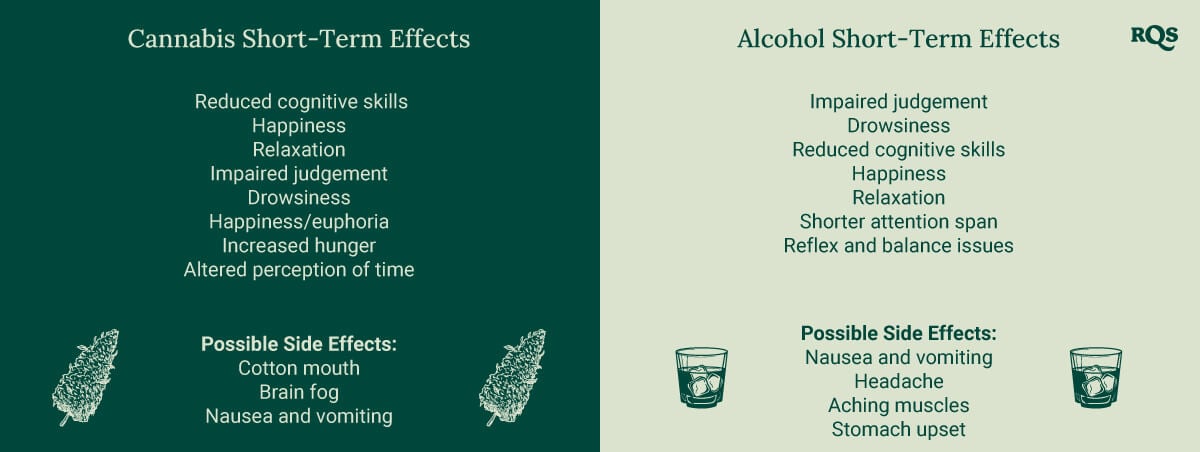
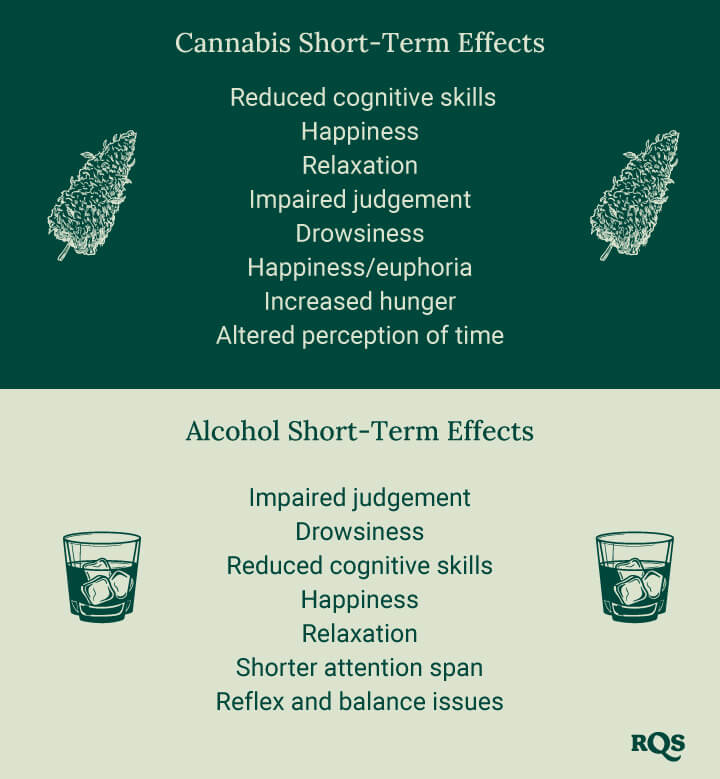
-
Possible Side Effects
However, when you start comparing the possible adverse effects (and how long they last), the trending decline in drinking culture makes a lot of sense.
While weed hangovers are possible, they’re uncommon, and symptoms don’t usually last more than a few hours. However, there is still the risk of greening out—a condition that can occur if you have a low tolerance.
| From drinking alcohol | From smoking weed |
|
Nausea and vomiting |
Cotton mouth |
| Headache | Brain fog |
| Aching muscles |
Nausea and vomiting |
| Stomach upset |
| From drinking alcohol | From smoking weed |
|
Nausea and vomiting |
Cotton mouth |
|
Headache |
Brain fog |
|
Aching muscles |
Nausea and vomiting |
|
Stomach upset |
-
Health Implications
Here’s where the debate surrounding alcohol versus marijuana heats up. Even though alcohol has become an integral part of cultures worldwide, we now understand that long-term, regular consumption causes a myriad of problems for the mind and body. These include:
- Damage to the heart and stomach
- Infertility
- Liver disease
- Pancreatitis
- High blood pressure
Of course, weed is not without its health implications too. The possible long-term impact of chronic cannabis use includes:
- Mental health issues (including conditions such as psychosis and schizophrenia)
- Brain development issues in adolescents
Now, on the face of it, it appears as if cannabis has fewer long-term health implications. And if you’re asking whether smoking weed is better than drinking, based purely on the impact to health, you’d probably think that it is. However, it’s crucial we point out that studies into the long-term effects of cannabis use are limited, even more so when compared to alcohol. We simply don’t have the same degree of qualitative, long-term data on cannabis use as we do alcohol.
-
Cost
To keep the comparison as objective as possible, we also need to consider the price of both substances, especially as they are mostly enjoyed recreationally. How much does it cost to drink versus smoke a joint? Again, it’s challenging to give an exact comparison, as the way we consume both substances varies significantly. Still, if we take a common scenario, such as drinking on a night out or having friends over to smoke, we can give a general idea of the cost implications.
According to data from a 2022 Statista survey[7], drinks on a night out in the UK costs an average of £34, and that’s not accounting for transport, getting ready during the day, and entry to clubs or pubs. Comparatively, an eighth of weed is estimated to cost roughly £18, not including rolling papers or a smoking device such as a vaporizer or bong. It’s a rudimentary comparison, but basic costs for cannabis appear to be lower compared to drinking.
-
Legality
An area where alcohol clearly wins out is legality. It’s legal to buy and consume alcohol (provided you’re old enough) in virtually every country in the world. Cannabis, on the other hand, is still experiencing widespread prohibition, and in many parts of the world, cannabis use can carry a hefty prison sentence.
Fortunately, the situation is changing, with Canada, Germany, and numerous states in the US approving cannabis use both recreationally and medicinally. It will probably come as no surprise that these areas are also experiencing a rise in daily cannabis use alongside a decline in daily drinking. Still, we have a long way to go before cannabis is as universally accepted as alcohol, and as a result, alcohol will remain easier to access and consume for the time being.
What About Combining Cannabis and Alcohol?
So far, we’ve focused exclusively on the trend of replacing alcohol with cannabis and how they compare, but what about combining both substances? Well, drinking and smoking (also called crossfading) can certainly work, but it's a delicate balancing act that can very quickly spiral out of control.
Not only do you have to contend with the intoxicating effects of both alcohol and THC, but it appears that “boozing while vaping significantly increases levels of THC and the metabolite 11-hydroxy-THC”. In essence, smoking and drinking will make your weed feel more potent, increasing the chance of unwanted side effects or even greening out.
When you also consider that alcohol impairs your judgement, crossfading is a practice most people avoid. If you want to experience the sensation for yourself, then there are a couple of essential tips we recommend, including smoking first before you have a drink.
Is Replacing Alcohol With Weed a Healthier Option?
Whether it’s unwinding after work or socialising with friends, both weed and alcohol provide sought-after effects. However, with legal access to weed increasing, the preference for marijuana over drinking appears to be rising in kind. Then, of course, you have what appears to be the most influential factor—health implications. Based on our current understanding of long-term effects, weed appears to “beat” alcohol with fewer adverse effects.
However, the volume of research surrounding alcohol use is significant compared to weed use. For now, it’s up to you as an individual to decide whether alcohol or weed is a better fit for your lifestyle. From a recreational perspective, both can enhance or augment social situations, but both also come with pretty undesirable side effects should you push the envelope a little too far. Of course, enjoy everything in moderation, and there’s no reason you cannot have a fruitful relationship with either!
- https://d3nkl3psvxxpe9.cloudfront.net/documents/crosstabs_Marijuana.pdf
- 2021-2022 Older Adult Behavioral Health | CBHSQ Data https://www.samhsa.gov
- https://onlinelibrary.wiley.com/doi/full/10.1111/add.16519
- Cannabis – the current situation in Europe (European Drug Report 2023) | www.euda.europa.eu https://www.emcdda.europa.eu
- Why work drinking culture is fading https://www.bbc.com
- Bloomberg - Are you a robot? https://www.bloomberg.com
- Average spending on nights out in the UK 2022 | Statista https://www.statista.com


























